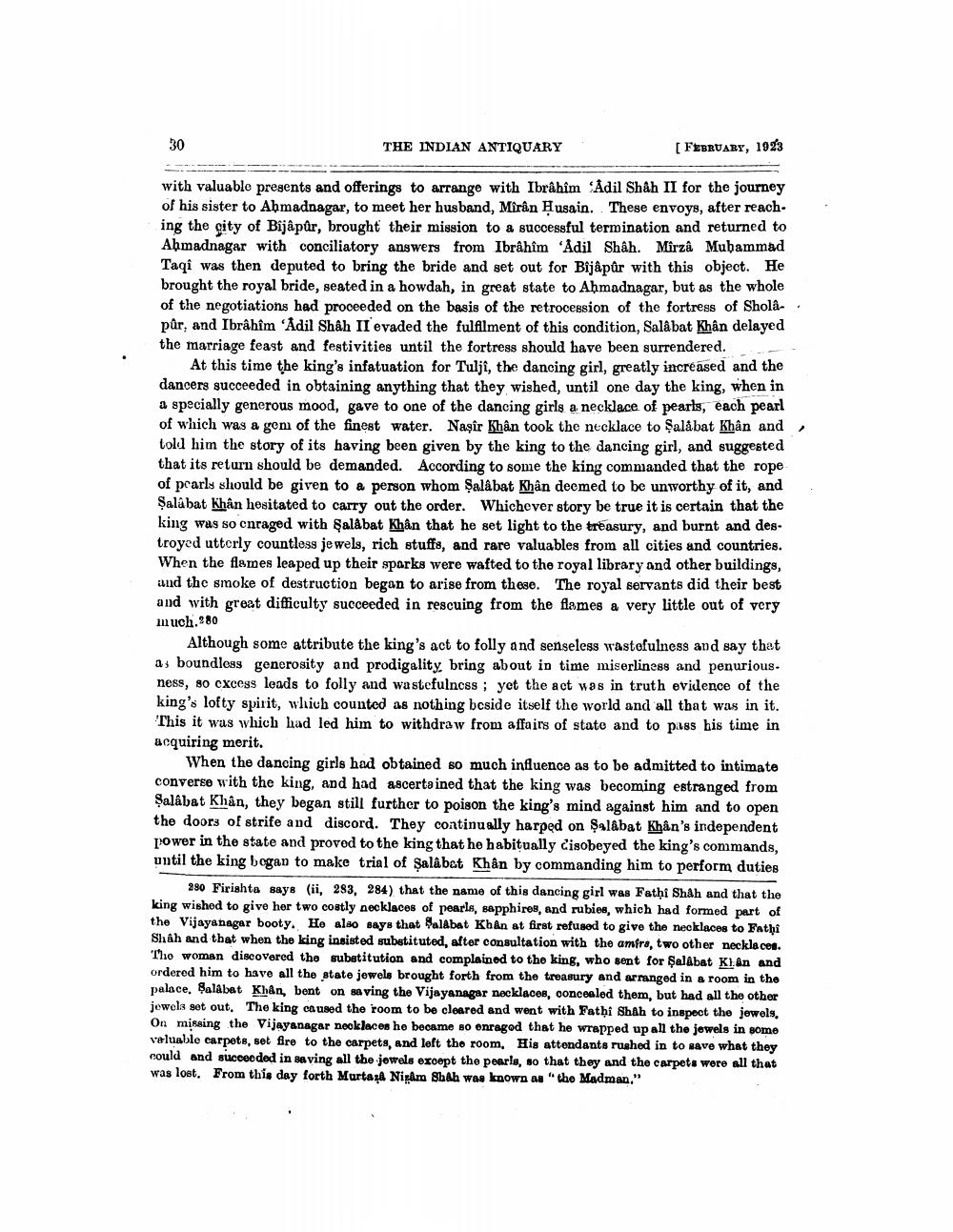________________
THE INDIAN ANTIQUARY
[ FEBRUARY, 1923 with valuable presents and offerings to arrange with Ibrâhîm Adil Shah II for the journey of his sister to Ahmadnagar, to meet her husband, Mîrân Husain. These envoys, after reaching the city of Bîjâpûr, brought their mission to a successful termination and returned to Ahmadnagar with conciliatory answers from Ibrâhîm 'Adil Shâh. Mîrzâ Muhammad Taqi was then deputed to bring the bride and set out for Bîjâpûr with this object. He brought the royal bride, seated in a howdah, in great state to Ahmadnagar, but as the whole of the negotiations had proceeded on the basis of the retrocession of the fortress of Sholâpûr, and Ibrâhîm 'Adil Shâh II evaded the fulfilment of this condition, Salâbat Khân delayed the marriage feast and festivities until the fortress should have been surrendered.
At this time the king's infatuation for Tulji, the dancing girl, greatly increased and the dancers succeeded in obtaining anything that they wished, until one day the king, when in a specially generous mood, gave to one of the dancing girls a necklace of pearls, each pearl of which was a gem of the finest water. Nasir Khân took the necklace to Salabat Khân and told him the story of its having been given by the king to the dancing girl, and suggested that its return should be demanded. According to some the king commanded that the rope of pearls should be given to a person whom Salâbat Khân deemed to be unworthy of it, and Şalabat Khân hesitated to carry out the order. Whichever story be true it is certain that the king was so enraged with Salabat Khân that he set light to the treasury, and burnt and destroyed utterly countless jewels, rich stuffs, and rare valuables from all cities and countries. When the flames leaped up their sparks were wafted to the royal library and other buildings, and the smoke of destruction began to arise from these. The royal servants did their best and with great difficulty succeeded in rescuing from the flames a very little out of very much.280
30
Although some attribute the king's act to folly and senseless wastefulness and say that as boundless generosity and prodigality bring about in time miserliness and penurious. ness, so excess leads to folly and wastefulness; yet the act was in truth evidence of the king's lofty spirit, which counted as nothing beside itself the world and all that was in it. This it was which had led him to withdraw from affairs of state and to pass his time in acquiring merit.
When the dancing girls had obtained so much influence as to be admitted to intimate converse with the king, and had ascertained that the king was becoming estranged from Salâbat Khân, they began still further to poison the king's mind against him and to open the doors of strife and discord. They continually harped on Salabat Khân's independent power in the state and proved to the king that he habitually disobeyed the king's commands, until the king began to make trial of Salâbat Khân by commanding him to perform duties
290 Firishta says (ii, 283, 284) that the name of this dancing girl was Fathi Shah and that the king wished to give her two costly necklaces of pearls, sapphires, and rubies, which had formed part of the Vijayanagar booty. He also says that Salabat Khân at first refused to give the necklaces to Fathi Shah and that when the king insisted substituted, after consultation with the amfrs, two other necklaces. The woman discovered the substitution and complained to the king, who sent for Salabat Khan and ordered him to have all the state jewels brought forth from the treasury and arranged in a room in the palace, Salabat Khân, bent on saving the Vijayanagar necklaces, concealed them, but had all the other jewels set out. The king caused the room to be cleared and went with Fathi Shah to inspect the jewels, On missing the Vijayanagar necklaces he became so enragod that he wrapped up all the jewels in some valuable carpets, set fire to the carpets, and left the room. His attendants rushed in to save what they could and succeeded in saving all the jewels except the pearls, so that they and the carpets were all that was lost. From this day forth Murtaza Nizam Shah was known as "the Madman."




